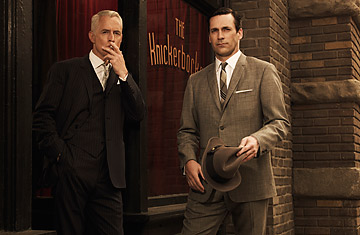
Mad Men
Don Draper, meet Friedrich Nietzsche. You might not think that the fictional ad exec from the critically acclaimed AMC drama Mad Men and the German philosopher have much in common, but consider this: Nietzsche believed happiness requires that a person forget the past in order to act boldly in the present — a methodology that Draper, who has denied his past by stealing a dead man's identity, seems to embrace.
That allusion, and more, come from Mad Men and Philosophy: Nothing Is as It Seems — a book of essays that examines the show through a philosophical lens. In it, philosophy professors reference classic works of philosophy by the likes of John Locke, Immanuel Kant, and Simone de Beauvoir to explore topics like Draper's identity crisis, the ethical lapses of the advertising business and the burgeoning feminism of the 1960s. For readers of a bloodier bent, there's also a companion to HBO's Southern Gothic vampire series, called — Freudian primal instincts, anyone? — True Blood and Philosophy: We Wanna Think Bad Things with You, which examines, for example, whether John Locke's theories on an individual's right to life, liberty and property should be expanded to include the undead.
Published in June, both titles are part of the Blackwell Philosophy and Pop Culture series, edited by William Irwin, a professor of philosophy at King's College, a small Catholic liberal arts institution in Wilkes-Barre, Penn. “Philosophy has had a bad rap for centuries," says Irwin. “People mistakenly think it has nothing to do with their everyday lives, including enjoying media.
Fourteen years ago Irwin, then 26 and a newly minted philosophy Ph.D., had begun teaching at King's. It was the late 1990s: Seinfeld was an integral part of the pop culture scene, and Irwin realized the title character "made observations and asked questions about everyday life, such as whether it was okay to break up with someone over the phone." These comments, he says, were often wrapped in the irony and sarcasm used by Socrates, who'd create a dialog of “what ifs," each response generating another question.
In an attempt to enliven his undergraduates' coursework, Irwin started peppering his lectures with comments about the show. In 1999 a small publishing house called Open Court released Seinfeld and Philosophy: A Book about Everything and Nothing, a collection of essays edited by Irwin and written by him and his philosophy-buddies. It has sold about 50,000 copies — which publishing experts consider to be very good sales figures. More than two dozen similar volumes, on everything from Buffy the Vampire Slayer to The Matrix, followed — including The Simpsons and Philosophy: The D'oh! of Homer, which reportedly sold half a million copies. "I could see down the line that this was a template that worked," says Irwin.
Now that the series is with publishing house Wiley, Irwin oversees up to half a dozen titles a year, relying on a network of about 500 writers — about 90 percent of whom are philosophy professors or teachers (the rest are other academics with a strong philosophical bent). Under Wiley's aegis, the series has so far churned out nearly two dozen “and Philosophy" books, including ones on The Office, Iron Man, Twilight, X-Men and 24. Its top-selling volume, House and Philosophy: Everybody Lies, connects TV's favorite renegade diagnostician, Dr. Gregory House, with 19th century British philosopher John Stuart Mill, who believed that eccentrics promote social progress. Another essay links House's misanthropy with Jean-Paul Sartre's dismal view of human relationships.
Hitting the shelves this month is 30 Rock and Philosophy: We Want to Go to There and, later this year, The Ultimate Lost and The Ultimate Harry Potter. Already in the works are books on Avatar and the works of Swedish writer Stieg Larsson, author of the massively popular thriller Girl With the Dragon Tattoo and its sequels.
Perhaps the series' biggest balancing act is straddling high-brow and pop-culture labels. Says Robert Thompson, professor of popular culture and television at University of Syracuse: "If pop culture can introduce fans to a much more complex and long-standing tradition, such as philosophy, that's a wonderful thing."
Many of the series' essayists use the books in their own classrooms. "One of our target audiences is academia," says Kitt Allan, the series' publisher at Wiley, noting that early this year Wiley created the web site www.andphilosophy.com primarily for professors and students who can cast votes for their wish list of titles. Ultimately, however, what gets published is a decision made by Irwin and Wiley's editors. "I personally get a lot of suggestions," says Irwin, "most of which are unusable." Indeed, not every show is food for philosophical thought. Irwin passed on American Idol because, he says, "the show doesn't generally prompt serious discussion after you see it."
In contrast, Socrates' adage — "The unexamined life is not worth living" — meets its match in Mad Men, where the characters do not engage in self-reflection. "Their alarming lack of self-awareness makes the show a fertile ground for philosophical discussion," says Irwin.
Irwin insists that the series' goal is for the television program or movie to be the vehicle to teach western philosophy. But he concedes that many people read the books to zero in on the philosophy behind what appears on the screen. "Pop culture is the commercial language of our time," he says. Contemplate on that.
